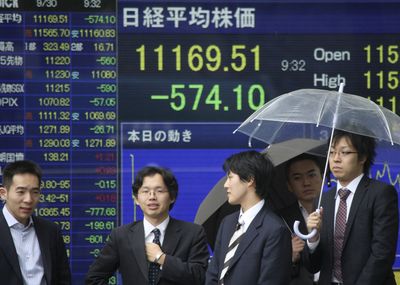Japan’s economy jolted by U.S. woes
Falling exports contribute to rare trade deficit

TOKYO – Wall Street’s plunge jolted Japan on Tuesday, as dismal new data here showed that the world’s second-largest economy, already contracting, has almost certainly fallen into recession.
Analysts said Japan’s troubles are likely to deepen as turmoil grows in the United States.
Japan’s benchmark Nikkei stock average fell 4.12 percent, closing at its lowest level in more than three years. The Nikkei was rebounding early today, gaining 1.24 percent by the end of the morning session.
In Tokyo, nerve-rattling news from Wall Street dovetailed with the release of worse-than-predicted government figures showing that factory output and consumer spending fell sharply in August, as unemployment rose to a two-year high of 4.2 percent.
Japan’s economy started shrinking in the second quarter of this year, ending its longest period of sustained growth since World War II. A decline in the third quarter now seems certain, several economists said.
Car shipments to the United States nosedived in August, down 30 percent as Toyota, Honda and Nissan all cut production.
Exports, the main engine of growth in Japan’s phenomenal postwar rise, have stalled this year. That fizzle, together with high fuel and food prices, gave Japan a rare trade deficit in August. In trading Tuesday, Toyota fell nearly 5 percent and Sony was off by more than 6 percent.
Confidence at major Japanese manufacturers worsened for the fourth straight quarter in September as businesses grew pessimistic amid an ongoing global slowdown, a central bank survey said today.
The Bank of Japan’s closely watched quarterly “tankan” survey showed that the sentiment index for large manufacturers fell to minus 3 in September, down sharply from 5 in June. It was the first negative reading in five years.
How the Japanese government will – or can – respond to the contracting economy remains an open question. Politically, the government, now under the leadership of its fourth prime minister in little more than two years, continues to struggle with a parliamentary deadlock.
Prime Minister Taro Aso, who assumed power last week, used his first speech to parliament on Monday to dress down the opposition Democratic Party of Japan for gumming up the government with political gamesmanship. Aso’s Liberal Democratic Party controls the lower house, while the opposition controls the upper house.
“The opposition thinks primarily of the political situation,” Aso said. “The lives of the people are a second or third priority.”
In a substantial break with his three predecessors as prime minister, Aso has announced plans to revive the economy by cutting taxes and increasing government spending. Critics fear this will revive pork-barrel spending on unneeded dams, bridges and roads – a hallmark of the ruling party’s governing style in the 1990s and before.
Aso is also considering a “very large investment tax credit” to entice Japanese companies into borrowing money, making new investments and perking up employment, according to Richard Koo, chief economist at the Nomura Research Institute and an Aso adviser.
Unlike in the United States or Europe, banks and many major companies in Japan are awash in cash. There is more than $14 trillion in personal assets on deposit here. Money is widely available for borrowing at interest rates below 1 percent.
Still, corporations are reluctant to borrow money. Koo said it’s a legacy of harrowing memories from Japan’s own economic meltdown, which lasted throughout the 1990s and into the early years of this decade.